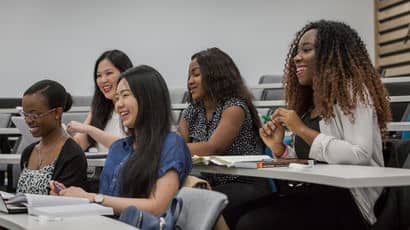Anti-racism
You can help make the places you work, live and study safer and more inclusive environments for everyone. Read on to find out what anti-racism is and what steps you can take towards creating an anti-racist environment that works for all of us.
What is racism?
Racism is a type of oppression based on race. It's rooted in historical systems of power. And is often simplified to mean discrimination against a person or group of people based on their race.
Experiencing racism is proven to have negative effects on both the physical and mental health of people from global majority backgrounds.
What is anti-racism?
Anti-racism is an active and intentional commitment to challenging, dismantling and eradicating racism in all its forms, both at an individual and systemic level.
"What's the problem with being "not racist"? It is a claim that signifies neutrality: "I am not a racist, but neither am I aggressively against racism." But there is no neutrality in the racism struggle. The opposite of "racist" isn't "not racist." It is "anti-racist"."
Ibram X. Kendi How to Be an Antiracist
What does it mean to be anti-racist?
To be effective, anti-racism requires commitments to ongoing critical reflection and processes of learning and unlearning.
It's vital that both psychological safety and harm reduction are prioritised, because engaging with anti-racism will at times feel uncomfortable. This discomfort should not be seen as an excuse to stop.
Being anti-racist also means actively opposing all forms of oppression, as racism is deeply interconnected with other systems of inequality. Anti-racist approaches often create ripple effects that benefit other marginalised groups, helping to build more inclusive, equitable environments for everyone.
Why should we be anti-racist?
When we choose to be anti-racist, we become actively conscious about race and racism and take actions to end racial inequities in our daily lives. Being anti-racist is believing that racism is everyone’s problem, and we all have a role to play in stopping it.
Anti-racism in and around the university
After months of listening, learning and collaborating with stakeholders across the university, we have published our new Anti-Racism Strategy.
This outlines our objectives, actions, key impact areas and measures of success for the next three years across four main strands of work:
- curriculum, practice and research
- staff diversity and development
- culture and belonging
- transformational leadership.
These examples highlight the actions and commitments that will help to bring the strategy to life across all areas of the university.
In learning and teaching
- Reviewing reading lists to better reflect global and diverse perspectives.
- Creating inclusive classroom environments where all students feel able to contribute and be heard.
- Taking action to learn from and embed best practice in relation to closing awarding gaps between white students and students from global majority backgrounds.
In recruitment and career development
- Making job adverts more inclusive and appealing to a broader.
- Ensuring diverse interview panels and fairer recruitment processes.
- Investing in positive action programmes to enhance representation and equality of opportunity.
In research and knowledge sharing
- Including community partners in research design and decision-making.
- Ensuring scholars from underrepresented backgrounds are credited equitably and that their work is given visibility.
- Exploring how research topics and methods can better address racial inequality.
In everyday life
- Speaking up when you hear or see racist comments, jokes or assumptions, even in casual settings.
- Taking time to learn about racism and its impact, rather than relying on others with lived experience to explain it to you.
- Listening to and believing people’s experiences of racism, without dismissing or downplaying them.
- Choosing to support businesses, artists and organisations led by people from diverse communities.
- Reflecting on your own privileges and how you can use them to create fairer spaces for others.
Private beliefs and biases about race and racism
Examples:
- Negative judgement of people because they are a different race
- Assuming someone’s abilities or interests based on stereotypes
- Internalised privilege – believing certain racial groups are superior to others
Racism expressed between individuals through words or actions
This can include racist microaggressions as well as more overt forms of racism.
Examples:
- Racial slurs, offensive comments or jokes about someone’s race or ethnicity.
- Using stereotypes when speaking to or about someone (e.g. assuming someone is in a junior or less qualified role because of their race).
- Making assumptions about someone’s language skills or intelligence based on their accent – also known as negative accent bias.
- Excluding a colleague from work meetings or social gatherings based on racial bias.
The unfair policies and discriminatory practices of an institution
These policies and practices routinely result in inequitable outcomes for people from Global Majority backgrounds.
Examples:
- Biased recruitment practices that limit opportunities for Global Majority candidates, leading to their under-representation in academic and senior leadership positions.
- Complaints procedures that are awkward or difficult to navigate, discouraging people from reporting racism.
- Student support services that do not accommodate the specific needs of racialised students.
- Course content that predominantly reflects Eurocentric perspectives, excluding Global Majority voices.
Systems and norms that perpetuate racial inequality across society
Examples:
- A Centre on the Dynamics of Ethnicity report found that prejudice and suspicion towards people from Global Majority backgrounds results in them being more likely to be stopped and search by police and more likely to receive longer sentences than White people in the UK.
- The Runnymede Trust and Greenpeace report that Global Majority communities are more likely to live in areas that are impacted by air pollution and have higher concentrations of waste facilities than white people. This can affect their overall quality of life and long-term health outcomes.
- According to Universities UK and the National Union of Students, ethnicity awarding and graduate outcome gaps affect the future earning potential of Global Majority students.
Global Majority
This collective term is used to refer to people who are Black, Asian, Brown, of Mixed Heritage, Indigenous to the Global South (including parts of Africa, Asia, Oceania, and South America), and/or not racialised as White.
UWE Bristol uses ‘Global Majority’ instead of terms like ‘BAME’ (Black, Asian and Minority Ethnic) to better reflect that these groups make up around 85% of the world’s population.
Following a period of consultation with students and staff, the term was adopted by UWE Bristol in November 2024. Aligned with our focus on anti-racism, this terminology is seen as empowering because it challenges Eurocentric ways of thinking and recognises that people from these diverse backgrounds are not minorities on a global scale. Therefore, you will come across ‘Global Majority’ being used increasingly throughout the University and in our external communications.
However, we acknowledge that language preferences are deeply personal and recognise that not everyone will identify with this term. Language evolves with time and no single term can capture everyone’s experience. We support individuals using the language that best reflects their identity and encourage respectful dialogue around language and inclusivity.
Wherever possible, we also recommend referring to specific groups rather than using collective terms. This helps ensure accuracy and shows respect for the identities and experiences of different communities. For example, whenever relevant say ‘South Asian students’ or ‘Black staff’ instead of using more general terms like ‘Global Majority’.
Anti-racism resources
Anti-racism Terminology guide
Staff from UWE Bristol have put together an anti-racist terminology guide. It will be available soon.
The guide was developed to support members of the University’s rich and diverse community to deepen their understanding and enhance their confidence in using anti-racist language. It can be used by anyone and everyone!
Read
- Black Skin, White Masks - Franz Fanon
- Kindred - Octavia Butler
- Ain’t I a Woman - bell hooks
- Half of a Yellow Sun - Chimamanda Ngozi Adichie
- Open Water - Caleb Azumah Nelson
- Africa is Not a Country - Dipo Faloyin
- Born a Crime - Trevor Noah
- A Woman Like Me - Diane Abbott
- The Vanishing Half - Brit Bennett
- (Academic journal) Mikkaka Overstreet: pdf icon My First Year in Academia or the Mythical Black Women Superhero Takes on the Ivory Tower
- (Essay) Gayatri Spivak - Can the Subaltern Speak?
Listen
The Changemaker Podcast Series is about highlighting work that is taking place across UWE Bristol to transform futures and drive positive impacts. This special series features six of our Black academics that are each pioneering change in their research areas and teaching practice. The series celebrates each of these amazing academics and confronts a range of racial justice issues in the Higher Education sector.
- Amy Saleh
- Malcolm Richards
- Professor Shawn-Naphtali Sobers
- Professor Angelina Sanderson-Bellamy
- Ann de Graft-Johnson
- Professor Emmanuel Adukwu
Watch
- The Open University (2022). Good Hair: Perceptions of Racism (Award winning short film)
- Channel 4 (2020). Heartbreaking Moment When Kids Learn About White Privilege | The School That Tried to End Racism
- TED (2016) The urgency of intersectionality | Kimberlé Crenshaw
- BBC iPlayer (2023). Dreaming Whilst Black
Please be mindful that this is by no means an exhaustive list of suggestions and that engaging with some or all of these actions does not necessarily make you an anti-racist.
Anti-racism demands a deep and sustained commitment to taking action and challenging inequalities at personal, institutional and societal levels.
You may also be interested in

Supporting Global Majority students
Support services and resources for students who identify as Global Majority.

Hate incident reporting
Guidance for students, staff, visitors and contractors about reporting bullying, harassment and hate incidents.

Health and wellbeing
Health and wellbeing services for students at the University.
